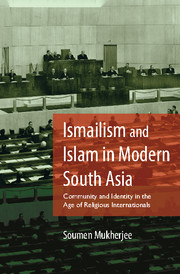 Ismailism and Islam in Modern South Asia
Ismailism and Islam in Modern South Asia Book contents
- Frontmatter
- Contents
- Acknowledgements
- List of Abbreviations
- Glossary
- Note on Transliteration
- Introduction
- 1 The Khoja Ismailis and Legal Polemics Religion and Customs in Nineteenth Century Bombay
- 2 The Howardian Moment Morality, Aryanism and Scholarship
- 3 Pan-Islamism and an Asiatic Spirit Postnational Subjectivities in an Age of ‘Transition’
- 4 The Hazir Imam, Ismailism and Islam in Late Colonial South Asia
- 5 The Importance of Being Ismaili Religious Normativity and the Ismaili International in the Age of Global Assemblages
- Concluding Reflections
- Select Bibliography
- Index
2 - The Howardian Moment Morality, Aryanism and Scholarship
Published online by Cambridge University Press: 23 July 2017
- Frontmatter
- Contents
- Acknowledgements
- List of Abbreviations
- Glossary
- Note on Transliteration
- Introduction
- 1 The Khoja Ismailis and Legal Polemics Religion and Customs in Nineteenth Century Bombay
- 2 The Howardian Moment Morality, Aryanism and Scholarship
- 3 Pan-Islamism and an Asiatic Spirit Postnational Subjectivities in an Age of ‘Transition’
- 4 The Hazir Imam, Ismailism and Islam in Late Colonial South Asia
- 5 The Importance of Being Ismaili Religious Normativity and the Ismaili International in the Age of Global Assemblages
- Concluding Reflections
- Select Bibliography
- Index
Summary
We have no history of the Ismailis by one of themselves… I will no longer call them Assassins, but I will speak of them by the name which they themselves employed, namely “Ismailies” and “Batenites”.
E. I. Howard, 1866Scholars have shown how the terms ‘Ismā’īliyya’, ‘Bāţiniyya’, ‘Ta‘limiyya’ and ‘Nizāriyya’, in addition to the pejorative term ‘malāḥida’ (heretic) were all used by the majority of Muslim writers to refer to Ismailis throughout the medieval times. Furthermore, the term ‘assassin’ was used by the Orientalist scholars, and before them mostly by Crusaders and other European observers, to refer to the Ismailis. Its etymological root goes back to ‘ḥashīshiyya’, deriving in turn from the drug ‘ḥashīsh’, which the Nizari chiefs allegedly used to control their followers. Without dwelling on the origin of each of these semantic categories it is still possible to highlight the preponderantly prejudiced slant in early medieval, and later, Orientalist scholarship on the community we now know as the Ismailis. However, ours is an effort to understand in particular an intervention that perhaps for the first time addressed some of these conceptual issues: the critical inflections, the tortuous narrative of marginalization, and their receptions in popular psyche. Indeed, scholarship on the Ismailis has come a long way to appreciate the structural and methodological aporia that characterizes the vast corpus of the Orientalist venture(s) on the subject. The methodological issues brought up in this new spate of scholarship are also centrally relevant in conditioning the ideational bases of the organized academic endeavour now labelled as ‘Ismaili Studies’. Under the aegis of the Institute of Ismaili Studies (IIS, established 1977) in London in particular – an institution that has been seen as reflecting ‘the imamate's interest in Western-style liberal arts education’ – ‘Ismaili Studies’ now represents an epistemological entity in its own right, carving out as well as facilitating understanding of at once a Fatimid cultural past as well as a Muslim universality for the global Ismaili community. However, what is still glossed over or, to be charitable, only inadequately addressed in narratives tracing this new spate of scholarship, is the pertinence of the epistemic intervention that characterized the speech of the Defence Counsel of Aga Khan I in the 1866 Aga Khan Case.
- Type
- Chapter
- Information
- Ismailism and Islam in Modern South AsiaCommunity and Identity in the Age of Religious Internationals, pp. 53 - 76Publisher: Cambridge University PressPrint publication year: 2016


